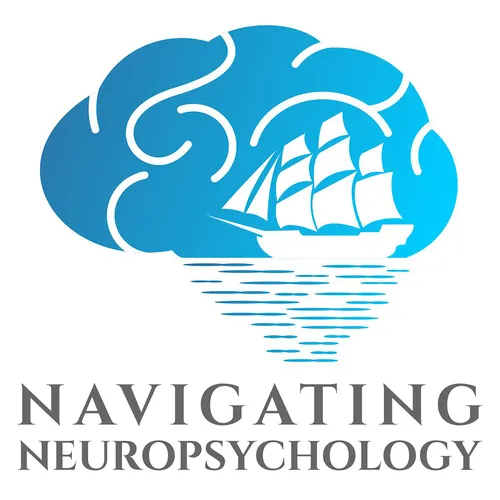
Navigating Neuropsychology
Join John and Ryan as they explore the field of neuropsychology through the presentation of cutting edge scientific findings, discussion of important topic areas, and interviews with experts in a variety of relevant fields. The three main objectives of the podcast are to
1) Provide interesting, relevant, and easily-accessible information for students and professionals in neuropsychology, as well as anyone who is interested in brain-behavior relationships.
2) Begin working towards unification on important areas of debate within neuropsychology, while also encouraging the expression of diverse, creative ideas and opinions.
3) Act as an outlet for innovative ideas and breaking news in the field, to allow listeners to stay abreast of current scientific and professional developments in neuropsychology.
Check out www.NavNeuro.com for more information about the show.
- Update frequency
- every 15 days
- Average duration
- 60 minutes
- Episodes
- 174
- Years Active
- 2018 - 2025

74| Global Neuropsychology: Introduction – A Conversation With Dr. Tedd Judd
This episode covers cultural neuropsychology and global neuropsychology. We talk with Tedd Judd, Ph.D., ABPP-CN, about how neuropsychology in North Atlantic countries is unique relative to how neuro…

73| Neuropsych Bite: Acute Disseminated Encephalomyelitis (ADEM) – A Conversation With Dr. Lana Harder
Acute disseminated encephalomyelitis (ADEM) is a rare, monophasic autoimmune condition affecting the brain and spinal cord. The symptoms of ADEM can be variable, given that lesions can present in mul…

72| Characteristics of Neuropsychologists: The Salary Surveys – A Conversation With Dr. Jerry Sweet
Neuropsychology is a dynamic and growing field, and there is considerable interest in characterizing and understanding the current state of the profession. The “Salary Survey,” led by Dr. Jerry Swee…

71| Neuropsych Bite: Pediatric Transverse Myelitis – A Conversation With Dr. Lana Harder
Transverse myelitis is a disorder of spinal cord inflammation and demyelination. Although more common in adults, it does occur in children. In the past, people believed that transverse myelitis was n…

70| ADHD – A Conversation With Dr. Robb Mapou
Attention deficit/hyperactivity disorder (ADHD) is a common neurodevelopmental disorder, with effects on academic and occupational performance, social relationships, and other aspects of functioning.…

69| Becoming a Neuropsychologist – A Conversation With Dr. Jeremy Sharp
Becoming a neuropsychologist is a long, challenging journey that can also be incredibly rewarding. In this episode, John and Ryan are interviewed by Dr. Jeremy Sharp of The Testing Psychologist about…

68| Obstructive Sleep Apnea and Neuropsychology – A Conversation With Dr. Mark Aloia
Obstructive sleep apnea (OSA) is a disorder of breathing during sleep. It can lead to both sleep fragmentation and hypoxia, it has a negative impact on cardiovascular functioning, and it is associat…

67| Neuropsych Bite: Pediatric Multiple Sclerosis – A Conversation With Dr. Lana Harder
When multiple sclerosis (MS) is diagnosed prior to age 18, it is considered rare and referred to as pediatric MS. Although they share a name, pediatric MS differs somewhat from MS in pattern and sev…

66| SuperAging – A Conversation With Dr. Emily Rogalski
The Alzheimer’s Association reports that 50% of older adults above age 80 have Alzheimer’s disease. Within the 50% of older adults who do not meet criteria for Alzheimer’s disease, most experience t…

65| Neuropsych Bite: Pediatric Teleneuropsychology – A Conversation With Dr. Lana Harder
As the COVID-19 pandemic endures, many neuropsychologists continue to conduct neuropsychological assessments via telehealth platforms. Increased knowledge about telehealth practices garnered from cl…

64| Spina Bifida and Hydrocephalus – A Conversation With Dr. Christine Koterba
Approximately one in every 2,800 babies are born with spina bifida each year. Spina bifida is related to multiple physical and neurological symptoms including hydrocephalus, which differs from its p…

63| COVID-19: The Role of Neuropsychology – A Conversation With Dr. Chaya Fridman
Emerging research suggests that a sizeable portion of individuals hospitalized due to COVID-19 develop cognitive and psychological sequelae. In our conversation with Dr. Chaya Fridman, a board-certi…

62| Multiple Sclerosis: Cognitive and Emotional Sequelae – A Conversation With Dr. Peter Arnett
About 50% of individuals with multiple sclerosis (MS) exhibit cognitive deficits in additional to physical symptoms. Depression and fatigue are also common in MS and can be debilitating. Therefore,…

61| Specific Learning Disorders – A Conversation With Dr. Robin Peterson
Models for diagnosis and treatment of learning disorders have changed over time. Still, there are many old beliefs and myths that may lead parents and schools in the wrong direction when working wit…

60| Fundamentals of Human Neuropsychology – A Conversation With Dr. Bryan Kolb
The book Fundamentals of Human Neuropsychology was born of a need that Dr. Bryan Kolb recognized while completing his postdoctoral fellowship at the Montreal Neurological Institute with Dr. Brenda Mi…

59| Neuropsych Bite: Limbic Encephalitis – A Conversation With Dr. Joel Kamper
In our last Neuropsych Bite with Joel Kamper, Ph.D., ABPP-CN, we discuss limbic encephalitis, a condition involving inflammation of the limbic system that typically results in memory deficits, psycho…

58| Keeping Neuropsychology Relevant: The AACN Relevance 2050 Initiative – A Conversation With Dr. Tony Stringer
The Relevance 2050 Initiative was first approved by the board of the American Academy of Clinical Neuropsychology (AACN) in 2015 to direct efforts to address the increasing diversity of the United St…

57| Neuropsych Bite: Balint’s Syndrome – A Conversation With Dr. Joel Kamper
We bring you another Neuropsych Bite with Joel Kamper, Ph.D., ABPP-CN, to discuss Balint's syndrome, a rare neurological condition characterized by optic ataxia, oculomotor apraxia, and simultanagnos…

56| The D-KEFS, D-KEFS 2.0, and CVLT-3 – A Conversation With Dr. Dean Delis
There are several hallmark assessments of memory and higher-level cognitive functions that are commonly used and recognized by neuropsychologists. Among these are the Delis-Kaplan Executive Function…

55| Neuropsych Bite: Moyamoya – A Conversation With Dr. Joel Kamper
In this Neuropsych Bite, we brought Joel Kamper, Ph.D., ABPP-CN, back on the podcast to discuss moyamoya, a rare condition that causes transient ischemic attacks and/or repeated strokes. The term "m…